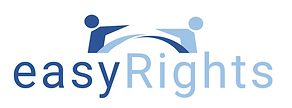Online Hackathons, a Solution During the Pandemic
- Laura Gavrilut
- Feb 24, 2021
- 2 min read
Updated: Feb 15, 2022

Some European studies confirm the big problems migrants have in integrating with our social systems. Integration times can go from 11 to 20 years. Such difficulties are sometimes starting from the moment they have to register themselves or their residence in the hosting country, or prepare an identity document or even when trying to get an appointment in public offices.
The services offered to migrants are sometimes using the same office, documentation and procedure as the services offered to local residents, but while local residents may have some problems interpreting the bureaucratic language that describe the procedures, the same problems are amplified by the migrants language problems.
For this reason the easyRights project, is proposing some services that facilitate the comprehension of official documents and support language learning in the hosting county.
In order to integrate the project with the common practices in local public administrations, the project proposes a double cycle of hackathons. In between 18-20 Feb, the hackathon in Palermo closed the first cycle, after the hackathons in Birmingham, Larissa and Malaga.
easyRights services are based on the use of AI to interpret documents and official forms and creates instructions for migrants, mini-courses to recognize the key terms in the bureaucratic processes and to recognize and pronounce the key terms, when visiting public offices, or attending an interview.
easyRights hackathons are not exactly like the “mainstream” hackathons, in which groups of enthusiastic developers are working for 48 hours, supported by sandwitch, pizza and beer, to produce new apps. easyRights interprets hackathons as a creative problem solving process, that will introduce the winning teams to a collaboration with the public administration, with the aim of adapting existing services. The teams participating in the hackathons also include lawyers, social experts that work to support migrants in their everyday life, and designers. This mix of competences generated projects that offer migrants in Palermo the possibility to fill in modules in their original languages – that will be printed in Italian, or produce checklists of documents for the registration office. The solutions are linked to the municipal system to book an appointment at the registration office, in order to make the migrant’s visit at the office as short and efficient as possible, thus also increasing the efficiency of the whole office.
For the first time this kind of hackathon happened online (the whole cycle, including Birmingham, Larissa and Malaga) and also attracted the interest of people that were sometimes living far away from the municipality organizing the hackathon. The second cycle will start this summer, hopefully in person, and promises to be a great opportunity to facilitate and simplify the life of those that, for necessity or for a destiny, become new citizens of our cities.
(Thanks to Nicola Morelli)




Comments